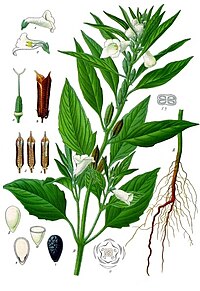
Photo from wikipedia
ABSTRACT Sesame (Sesamum indicum L.) is an important oil crop and one of the oldest-known oil crops to humankind. Sesame has excellent nutritional and therapeutic properties; it is rich in… Click to show full abstract
ABSTRACT Sesame (Sesamum indicum L.) is an important oil crop and one of the oldest-known oil crops to humankind. Sesame has excellent nutritional and therapeutic properties; it is rich in important fatty acids, protein, fiber, and vital minerals. Oil percentage varies among different genotypes but generally accounts for more than 50% of the seed’s dry weight. To meet the increasing demand for vegetable oil production worldwide, expanding the cultivation of oil crops in newly reclaimed areas worldwide is essential. Molecular breeding is an expeditious approach for varietal improvement but requires efficient transgenesis. Published sesame transformation methods are highly genus-specific, tedious, and involve preparing and testing different media and explants. We produced transgenic sesame plants using a stable, noninvasive, and robust Agrobacterium tumefaciens transformation method. Leaves and flowers excised from the T0 plants at different developmental stages were PCR screened, and 61/93 seedlings were found to be PCR positive. T1 seeds resulting from two lines were germinated in a biocontainment greenhouse facility and screened using PCR, basta leaf painting, and spraying fully matured plants with basta herbicide (0.02 mg/l); non-transgenic segregants and control non-transgenic plants were severely damaged, and eventually died, while transgenic plants were not affected by the Basta spraying. RT-PCR on T1 plants indicated the presence of Bar transcripts in T1 progeny. Furthermore, RT-PCR using NPTII primers did not result in any amplification in transgenic sesame plants (NPTII is present in the vector but not in the T-DNA region) indicating that the transgenic sesame plants were not an Agrobacterium-contaminant.
Journal Title: GM Crops & Food
Year Published: 2023
Link to full text (if available)
Share on Social Media: Sign Up to like & get
recommendations!